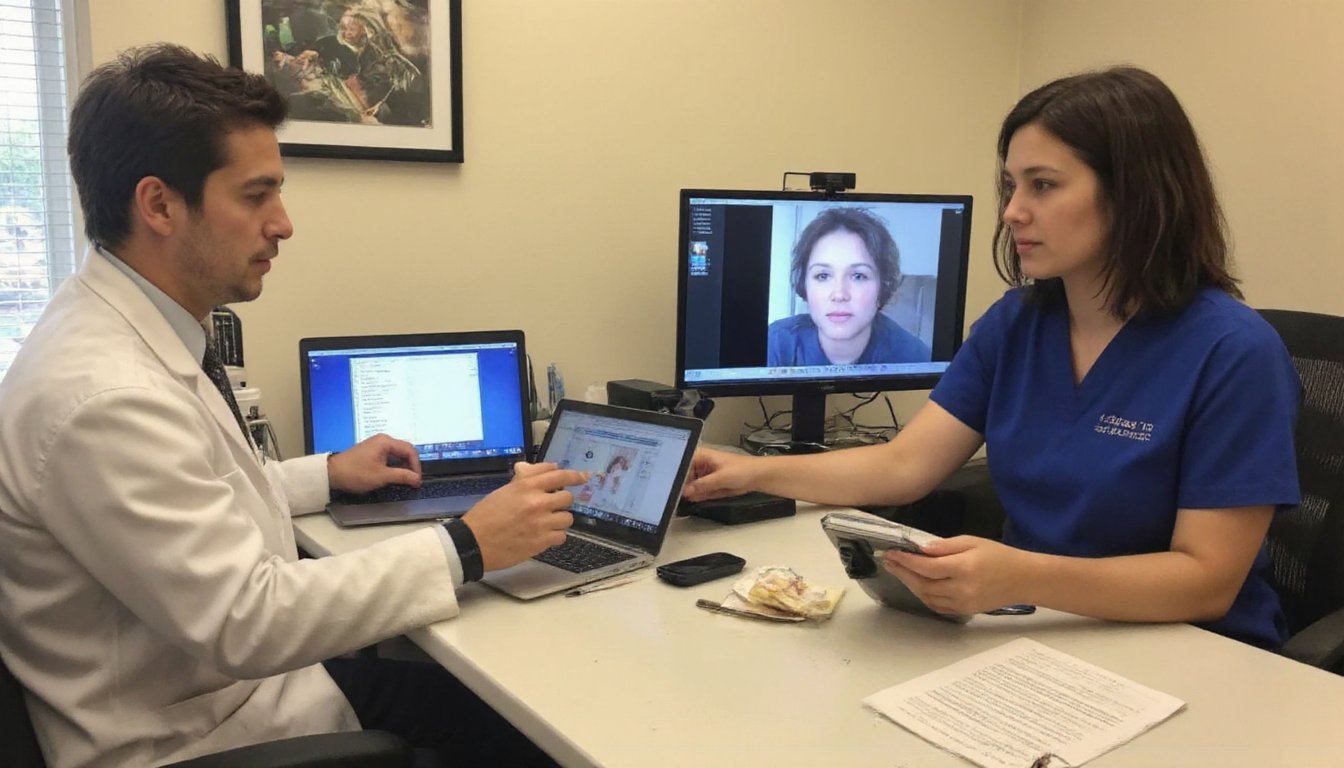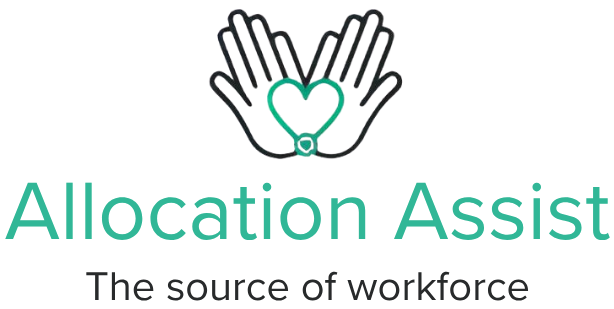Healthcare careers attract professionals due to exceptional job security, with 1.9 million annual openings projected through 2033, and competitive salaries starting at $242,000 for physicians. You’ll find extensive loan forgiveness programs, flexible work arrangements, and cutting-edge technological innovations that keep the field exciting. With robust professional development opportunities and the chance to make a meaningful impact on lives, healthcare offers both personal and financial fulfillment. Let’s explore how you can thrive in this dynamic field.
The Growing Demand for Healthcare Professionals

As healthcare systems worldwide grapple with unprecedented challenges, the demand for qualified medical professionals continues to surge at an extraordinary pace. You’ll find expanding opportunities driven by an aging population requiring specialized geriatric care and palliative services. The rise in chronic diseases has created an urgent need for healthcare specialists who can work effectively in multidisciplinary teams. The industry’s shift toward virtual care models is creating additional career paths for tech-savvy healthcare professionals. You’re entering a field where caregiver support is increasingly essential, with growing emphasis on home care and preventive models. In community settings, you’ll discover diverse roles supporting elderly patients while helping implement innovative care solutions. Employment projections indicate an impressive 21% job growth in home healthcare services through 2031. The projected global shortage of healthcare workers means you’ll have job security and numerous advancement options. Whether you’re interested in direct patient care or supporting roles, the healthcare sector offers stable, meaningful career paths with long-term growth potential. The integration of artificial intelligence in healthcare delivery systems is opening up exciting new opportunities for professionals who can bridge clinical care with technological innovation.
Competitive Salaries and Financial Benefits
If you’re considering a healthcare career, you’ll find compelling financial rewards across various roles, from specialist physicians earning over $500,000 to nurse practitioners and physician assistants commanding $130,000+ annually. Family medicine physicians can expect competitive base salaries starting at $242,000 per year. Health informatics technologists can expect a promising career path with median earnings of $62,990 annually. You’ll discover significant growth potential through specialized training, with options like locum tenens assignments offering hourly rates of $110-$250 and specialized NP roles earning 23-30% more than general positions. Your career advancement can be further supported by loan forgiveness programs and retention bonuses, especially in high-demand or rural settings where healthcare professionals are urgently needed. The aging population trend continues to drive increased demand for healthcare workers, particularly in chronic disease management and geriatric care specialties.
High-Demand Salary Growth
The healthcare industry’s commitment to competitive compensation continues to drive substantial salary growth across all roles. You’ll find impressive high demand salary increases, with specialists like orthopedic surgeons and radiologists earning over $500K annually. Healthcare compensation reflects the sector’s recognition of your expertise and dedication. Recent data shows the industry plans 3.0% merit budgets for 2025.
| Role Type | Salary Growth |
|---|---|
| Specialists | 3.3% increase |
| NPs & MAs | 5.5% increase |
| Front Desk | 4.5% increase |
| Support Staff | 3.25% increase |
Whether you’re pursuing advanced practice roles or essential support positions, you’ll benefit from targeted salary increases across the industry. Nurse practitioners now average $130K, with specialty positions reaching $160K+. The industry also rewards flexibility, with locum tenens physicians earning $150-250 per hour. You’ll discover that healthcare careers consistently offer higher wages than other sectors, with median salaries 68% above the national average. Healthcare management positions have demonstrated particularly strong growth, with a 6.95% compensation increase in 2023.
Loan Forgiveness Programs
Healthcare professionals pursuing educational advancement can access substantial loan forgiveness opportunities through federal and state programs. You’ll find PSLF has expanded considerably, with over $79.4 billion discharged and more than a million borrowers approved under current policies. If you’re considering nursing, you can pursue forgiveness for both undergraduate and graduate loans, with programs offering up to $75,000 for specialized roles in underserved areas. Full-time employment in eligible healthcare facilities requires a minimum of 30 hours per week to qualify for most forgiveness programs.
However, recent developments like Project 2025 threaten to eliminate these vital loan forgiveness programs for healthcare workers. To maximize your loan eligibility, consider working in Health Professional Shortage Areas or Maternity Care Target Areas. Many state programs offer impressive benefits – like California’s CalHealthCares, which forgives $300,000 for qualifying physicians and dentists. While forgiveness criteria vary, you’ll find numerous options through federal, state, and local initiatives, especially if you’re willing to serve in high-need communities. The typical healthcare worker carries $20,000 to $25,000 in federal student loan debt, making these forgiveness programs particularly valuable for the profession.
Advancement Earning Potential
Beyond loan forgiveness benefits, your earning potential in medical careers offers compelling financial rewards. You’ll find diverse earning trajectories across specialties, with physicians averaging $376k and specialists reaching $543k annually. As a nurse practitioner, you can earn $130k+ annually, with specialty roles commanding even higher compensation. Your location and practice model greatly impact earnings urban settings typically offer higher rates to offset living costs. Healthcare managers are increasingly offering up to 20% more for full-time in-office positions. Whether you choose hospital employment, private practice, or locum tenens work, healthcare careers consistently offer robust financial growth potential while serving others.
| Role Type | Entry Level | Mid-Career | Advanced |
|---|---|---|---|
| Physician | $220k | $376k | $543k |
| NP Specialist | $130k | $160k | $180k+ |
| Private Practice | $300k | $350k | $400k+ |
| Locum Tenens | $120k/qtr | $150k/qtr | $180k+/qtr |
Job Security in an Evolving Economy
While many industries face disruption from automation, your future in healthcare remains remarkably secure with 1.9 million annual job openings projected through 2033. You’ll find comfort knowing that healthcare consistently proves recession-resistant, as demonstrated by the sector’s projected 7% global employment growth despite wider economic uncertainties. Your career prospects look especially promising in specialized roles like nursing and rehabilitation services, where aging populations drive sustained demand regardless of economic conditions. The critical shortage of healthcare workers, with a projected gap of 10 million by 2030, particularly affects low-income countries and highlights the growing employment opportunities in this sector. The rising adoption of digital transformation solutions is creating numerous new roles in healthcare IT, administration, and creative services across the industry.
Growing Demand Despite Automation
Despite rapid technological advances reshaping many industries, healthcare careers remain remarkably secure due to an unprecedented combination of demographic shifts and growing patient needs.
You’ll find strong automation resistance in healthcare, particularly in roles requiring human interaction and social care skills. While technology enhances medical capabilities, it can’t replace the essential human element of patient care. The sector’s job creation rate is projected to grow 14% through 2033, considerably outpacing other industries. With 1.9 million annual job openings expected from retirements and increasing demand, you’re looking at abundant opportunities across both clinical and nonclinical roles. The surge in demand is evident with Nurse Practitioners seeing a remarkable 46% growth rate. Women make up 80% of healthcare workers, demonstrating the industry’s strong commitment to workforce diversity. Even as healthcare organizations embrace digital transformation, they’re expanding their workforce with 74% increasing contract and remote positions in IT, management, and business strategy.
Healthcare’s Recession-Proof Nature
As economic uncertainties challenge many industries, healthcare stands out as a remarkably recession-resistant sector that continues to provide stable career opportunities. The field’s recession resilience is evident in its consistent job creation, with 143,000 healthcare positions added in January 2025 alone, maintaining a steady 4% unemployment rate.
You’ll find job stability across diverse specializations, from hospitals adding 13,900 positions to home health services growing by 10,600 jobs. Healthcare practitioners earn considerably higher compensation, averaging $83,090 compared to the national median of $49,500. With projections showing 1.9 million annual openings through 2033 and persistent workforce shortages reported by 58% of healthcare executives, you’re looking at a field that offers long-term security and growth potential regardless of economic conditions.
Technological Innovation and Career Growth

With technological breakthroughs reshaping healthcare delivery, you’ll find unprecedented career opportunities emerging at the intersection of medicine and innovation. Today’s technological trends are creating exciting roles that didn’t exist just a few years ago, from AI integration specialists to telemedicine program developers. Career innovation in healthcare now extends far beyond traditional clinical positions.
Healthcare’s digital revolution is creating groundbreaking career paths where technology and medicine converge, expanding possibilities beyond traditional roles.
- You can specialize in emerging fields like remote patient monitoring, where you’ll use AI to detect health risks and manage chronic conditions in real-time
- You’ll have opportunities to work with cutting-edge technologies like 5G-enabled remote surgery and AR-enhanced medical consultations
- You could develop expertise in healthcare data analytics, helping to create personalized treatment plans or optimize clinical trials through predictive modeling
Making a Meaningful Impact on Lives
Working in healthcare gives you the unique opportunity to directly improve patient outcomes through personalized care while addressing critical health challenges in underserved communities. You’ll contribute to medical knowledge advancement by participating in innovative treatment approaches and leveraging new technologies to enhance patient care quality. Whether you’re providing hands-on care, implementing community health programs, or analyzing health data to improve outcomes, your work will create lasting positive changes in people’s lives.
Direct Patient Care Impact
Healthcare professionals who pursue direct patient care roles in 2025 will find unprecedented opportunities to transform lives through personalized, tech-enabled treatment. You’ll leverage healthcare innovation to deliver meaningful impact while building lasting relationships with patients who increasingly value transparency and trust in their care providers.
- You’ll drive patient engagement through telehealth platforms and remote monitoring systems, reducing barriers to access while enabling proactive care management for chronic conditions
- You’ll utilize AI-powered tools and predictive analytics to identify at-risk patients early, allowing you to intervene before conditions worsen
- You’ll create personalized treatment plans informed by real-time data and community health insights, ensuring your care addresses both individual and population-specific needs
This direct impact on improving lives makes healthcare an incredibly rewarding career choice for 2025 and beyond.
Supporting Community Health Initiatives
Community-driven care initiatives represent a transformative path for healthcare professionals seeking to create lasting social impact in 2025. You’ll be part of innovative programs like ACO REACH, which serves 2.5 million Medicare patients through partnerships with over 900 safety-net clinics. By conducting targeted health assessments, you’ll identify critical needs, like improving cancer screening rates in underserved regions.
You’ll help shape the future of healthcare by participating in community partnerships that reach 31 million patients, with special focus on vulnerable populations. Through telehealth expansion and behavioral health integration, you’ll break down barriers to care access. Whether you’re working with FQHCs, implementing preventive care programs, or managing chronic conditions, you’ll contribute to measurable improvements in population health while advancing health equity in your community.
Advancing Medical Knowledge Daily
Beyond community outreach, the daily advancement of medical knowledge puts you at the forefront of transformative healthcare innovations. As healthcare professionals embrace digital health solutions and personalized therapies, you’ll contribute to groundbreaking developments that directly impact patient outcomes. Your role in this evolving landscape means you’re constantly learning and applying cutting-edge approaches to care.
- You’ll work with AI-powered tools and precision medicine to develop targeted treatments tailored to each patient’s genetic profile
- You’ll leverage telehealth platforms and remote monitoring systems to deliver care beyond traditional settings
- You’ll help implement preventive strategies using real-time data from wearables and AI diagnostics
Flexible Work Arrangements and Work-Life Balance
As the healthcare landscape evolves rapidly, flexible work arrangements have emerged as a critical factor in addressing nurse burnout and improving work-life balance. You’ll find that modern healthcare employers now prioritize adaptable scheduling options, with 98% of leaders noting increased demand for gig opportunities.
You can take advantage of innovative staffing approaches that let you control your shifts and workload intensity. Whether you prefer compressed work weeks, reduced hours, or gig-style contracts, you’ll discover flexible schedules that match your lifestyle. These arrangements help you maintain a healthier work-life balance while pursuing your passion for healthcare. Tech-enabled platforms make it easier to choose assignments based on your preferred location or specialty, while healthcare systems offering these options consistently report higher employee satisfaction and retention rates.
Professional Development Opportunities

Professional development stands at the heart of today’s healthcare careers, complementing the flexible work arrangements that support your daily schedule. With 70% of employers requiring certifications and 71% offering increased pay for credentials, your investment in professional growth directly impacts your earning potential and career mobility.
- You’ll find clear paths to advancement through credential importance, whether you’re pursuing certifications, bachelor’s degrees, or advanced specializations that align with emerging healthcare demands
- Through structured mentorship programs, you’ll bridge experience gaps while building both technical expertise and leadership skills
- Your commitment to ongoing education opens doors to specialized roles, with employers actively supporting your growth through financial incentives and targeted training programs
The healthcare field values your professional development, making it easier than ever to advance your career while making a meaningful impact.
Diverse Career Pathways and Specializations
The rapidly evolving healthcare landscape offers you unprecedented career opportunities, with projected growth of 13% adding 2.3 million new roles by 2031. You’ll find diverse roles spanning from hands-on patient care to administrative leadership, each with unique specialization options to match your interests and goals.
If you’re drawn to direct patient care, you can pursue careers as a nurse practitioner, physician assistant, or occupational therapist assistant. For those preferring support roles, positions like medical assistant or home health aide provide essential entry points with growth potential. You’ll also discover specialized paths in rehabilitation, preventive care, and telehealth monitoring. Whether you choose to invest in advanced degrees or start with certifications, healthcare offers clear advancement paths and competitive compensation, from entry-level positions to high-earning practitioner roles.
Strong Support Systems and Mental Health Resources
When you enter the healthcare field in 2025, you’ll find robust mental health resources and support systems designed to help you thrive in your career. Healthcare organizations understand the importance of protecting your well-being with extensive support networks that include flexible scheduling, peer counseling, and 24/7 virtual mental health services.
- You’ll have access to AI-powered wellness tools that proactively identify stress patterns and connect you with personalized support resources
- You’ll benefit from structured peer-support networks and interdisciplinary collaboration that combat professional isolation
- You’ll participate in specialized stress reduction workshops and mindfulness training programs that build long-term emotional resilience
These investments in your mental health reflect healthcare’s commitment to maintaining a sustainable, thriving workforce while ensuring you can deliver the highest quality patient care.
Remote Work Options in Healthcare Settings
Building on the foundation of strong mental health support, modern healthcare careers now offer unprecedented flexibility through remote work opportunities. Remote job trends show that 22% of the U.S. workforce will work remotely by 2025, and healthcare is at the forefront of this transformation. You’ll find diverse opportunities in telehealth expansion, from medical billing to virtual care coordination, allowing you to maintain work-life balance while making a meaningful impact.
You can expect significant benefits, including an average savings of $11,315 annually as a part-time remote worker. Whether you’re interested in clinical roles like telehealth nursing or non-clinical positions in healthcare IT, you’ll have access to secure platforms and cutting-edge technology that enable seamless patient care and team collaboration from anywhere.
Frequently Asked Questions
How Do Healthcare Workers Manage Emotional Attachment to Critically Ill Patients?
You’ll need to develop emotional resilience while maintaining professional patient boundaries to effectively manage attachments in critical care. Practice mindfulness techniques during your shifts, engage with peer support networks, and participate in structured bereavement protocols. You can also strengthen your coping skills through regular self-care habits and empathy training. Remember, it’s okay to care deeply while keeping healthy emotional distances – this balance protects both you and your patients.
What Percentage of Healthcare Professionals Switch Specialties During Their Careers?
While exact statistics on specialty changes aren’t directly tracked, you’ll find that career shifts are becoming more common in healthcare. The background data suggests significant movement, particularly into high-demand areas like psychiatry (7.8% growth) and neurology (6.9% growth). These changes often stem from seeking greater career satisfaction or responding to evolving healthcare needs. You’ll see many colleagues make strategic moves throughout their careers, especially when health systems offer specialized training programs to support these alterations.
Can Healthcare Workers Refuse to Treat Patients Against Their Beliefs?
Yes, you can refuse to treat patients when procedures conflict with your moral or religious beliefs, thanks to federal and state conscience protection laws. However, these rights must be balanced against patient rights and access to care. When facing ethical dilemmas, you’ll need to follow your institution’s protocols and guarantee patients receive alternative care options. Remember, your right to refuse treatment doesn’t extend to emergency situations where lives are at risk.
How Do International Healthcare Qualifications Transfer to Different Countries?
When you’re transferring your healthcare qualifications internationally, you’ll need to navigate credential recognition processes specific to each country. Most nations require verification of your education, licenses, and clinical experience through authorized bodies. Global standards are increasingly harmonized through organizations like WFME and ECFMG, but you’ll still need to meet local requirements. It’s best to start the process early, as credential evaluation can take several months to complete.
What Legal Protections Exist for Healthcare Workers Who Report Workplace Violations?
You’re protected by robust whistleblower protections when reporting workplace violations in healthcare. If you witness fraud, safety issues, or misconduct, you can report to authorized agencies without fear of retaliation. Federal laws like the Healthcare Whistleblower Protection Act and OSHA’s workplace safety regulations have your back. You’re also covered by HIPAA exemptions when reporting in good faith, and you can’t be fired, demoted, or harassed for speaking up.








